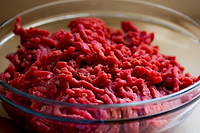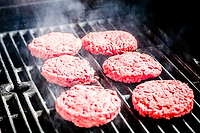Health Canada has long advised consumers to cook ground beef to 71 °C (equal to 159.8 °F). Now, researchers say that even this standard temperature recommendation might not kill all bacteria.
Food scientists at the University of Alberta have discovered that cooking ground beef to 71 °C does not always eliminate all strains of Escherichia coli, a bacterium found in the gut of both humans and animals.
Not all strains of E. coli are harmful. However, some E. coli--particularly O157--can lead to kidney failure. It can also be fatal.
“We’ve been hammering consumers for years to cook chicken properly, to handle it properly, and to do the same with ground beef. But still we seem to have these outbreaks of E. coli [attributed to hamburgers],” says Lynn McMullen, a food microbiologist in university’s Department of Agricultural, Food and Nutritional Science.
According to McMullen, this might explain the persistence of E. coli outbreaks related to ground beef.
The tendency for E. coli to still survive after proper cooking has been applied was actually first discovered 8 years ago. It didn’t become a focus until McMullen assigned a student to exclusively research the problem in 2008. University of Alberta houses beef, which made it easy for the student to look for differences in thermal survival among organisms in a large collection of E. coli from beef.
Ultimately, this could change the guidelines that consumers follow for cooking meat because the current standards may no longer be sufficient.
Sign up for Food Safety Magazine’s bi-weekly emails!




